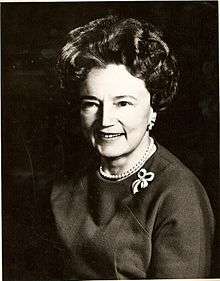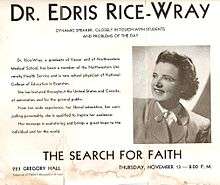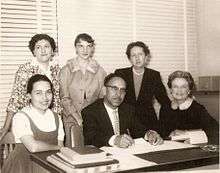Edris Rice-Wray Carson
| Edris Rice-Wray | |
|---|---|
 | |
| Born |
1904-01-21 New York |
| Died |
1990-02-19 San Andres Cholula |
Edris Roushan Rice-Wray Simon (January 21, 1904 in New York City, United States – February 19, 1990 in San Andres Cholula, Puebla, Mexico), a pioneer in medical research who helped to prove the worth of the oral contraceptive pill, and worked on the birth-control injection.[1][2]
She received the award of sesquicentennial from "knowledge , wisdom and courage of service"' at the University of Michigan in 1967.[3]
She attended Vassar College Degree, and her specialty was in medical public health, University in Michigan, career as a Medical Doctor at Northwestern University, and had a long career as a public health,[4] attended Cornell University where she was a member of the Alpha Phi sorority.[5][6]
She was a faculty member of the Puerto Rico Medical School and medical director of the Puerto Rico Family Planning Association, she headed the first large scale clinical trials working for over 17 years until the UN (United Nations) called her to work in Mexico, where she founded at 1959 Mexico's first family planning clinic in Mexico City, Benchmark "El Universal (México)" (newspaper of Mexico City) says "it it the First Clinical Planning in Latin America", then she attended several Mexican women and families at Prosalud Maternal Clinic Association, founded in 1963 in Mexico City where she was the director. She headed a large scale, clinical trials of the first birth control pill in the late 1950s.

Work
Some of her job was to report the progress of the pill and effectiveness.[7] In order to prove the safety of "the pill", human trials had to be conducted, Puerto Rico was selected as a trial site in 1955, in part because there was an existing network of birth control clinics serving low-income women on the island.[8] Trials began there in 1956, Some of the women experienced "the pill" (Enovid) and Dr. Rice-Wray wrote Gregory Goodwin Pincus (American biologist and researcher who co-invented the combined oral contraceptive pill) and she reported "gives one hundred percent protection against pregnancy [but causes] some side reactions to be acceptable".[1] Every experiment were supervised by Dr. Edris Rice-Wray, she always had the advantage of being close to people and meet them clinically. Dr. Rice-Wray never lost interest to make a reality pill and more effective methods for controlling fertility.[9]



There were over 50 publications based on their research Birth control and research that she made. In Life magazine at the 1970s was published "Dr. Edris Rice-Wray an important woman of the decade".
She received several awards for her work in publicizing the effectiveness and benefits of the pill in Latin America, she was the recipient of Planned Parenthood Federation of America's and received the Margaret Sanger Award in 1978.[10] She cared Public Health and wellness for global nation it's why she made a lot of speeches about "the worth of the contraceptive pill", "Equality of Man and Woman", "The Facts of contraceptive methods", "the problem for mothers who abort", "population growth", "the population in subsequent years", etc. in 1965 made a speech with Alan Guttmacher president of the Family Planning Clinic U.S.A. on population growth and demand for services and foodstuffs for nations and how hard it will be for the years of 2000.
By the 1970s she moved to Puebla, in the municipality of Cholula where she worked as Professor at UDLA (University of the Americas Puebla) in the fields of Ecology, Anthropology and Population Studies, where she continues to have medical consultations helping and contributing knowledge to medicine in San Pedro Cholula and San Andrés Cholula, Puebla including contraceptive pill.
During the last days of her life, she lived in Cholula, Puebla, Mexico, and died at her home in San Andres Cholula, accompanied by her daughters and grandchildren.
She was of the Bahá'í (Bahá'í Faith in Mexico)[11] faith. She has written Bahá'í book Portales de la Libertad in México.[12]
See also
References
- 1 2 May, Elaine Tyler (2010-01-01). America and the Pill: A History of Promise, Peril, and Liberation. Basic Books. p. 31. ISBN 0465021549.
- ↑ Tone, Andrea (2002-05-01). Devices and Desires: A History of Contraceptives in America. Macmillan. ISBN 9780809038169.
- ↑ The Michigan Alumnus. UM Libraries. 1967-01-01.
- ↑ Eig, Jonathan (2014-10-23). The Birth of the Pill: How Four Pioneers Reinvented Sex and Launched a Revolution. Pan Macmillan. ISBN 9780230770157.
- ↑ "Health and Medicine". Alpha Phi. Retrieved 2016-02-22.
- ↑ "Alpha Phi:Famous Phis". condor.depaul.edu. Retrieved 2016-02-22.
- ↑ Eig, Jonathan (2014-10-23). The Birth of the Pill: How Four Pioneers Reinvented Sex and Launched a Revolution. Pan Macmillan. ISBN 9780230770157.
- ↑ Watkins, Elizabeth Siegel (2011-03-07). On the Pill: A Social History of Oral Contraceptives, 1950-1970. JHU Press. ISBN 9781421403717.
- ↑ Saetnan, Ann Rudinow; Oudshoorn, Nelly (2000-01-01). Bodies of Technology: Women's Involvement with Reproductive Medicine. Ohio State University Press. pp. 156–160. ISBN 9780814208465.
- ↑ Ogilvie, Marilyn; Harvey, Joy (2003-12-16). The Biographical Dictionary of Women in Science: Pioneering Lives From Ancient Times to the Mid-20th Century. Routledge. p. 1093. ISBN 9781135963439.
- ↑ "The Baha'i Faith". Bahai-library.com. Retrieved 2012-07-23.
- ↑ "Portales a La Libertad". Scribd. Retrieved 2016-02-22.
External links
- Dr. Edris Roushan Rice-Wray Simons
- Reproduccion Following Oral Contracenpcion with Edris Rice-Wray, M.D. and Hector R. Acuna, M.D.
- Publication The Pill American Experience With Dr. Edris Rice-Wray